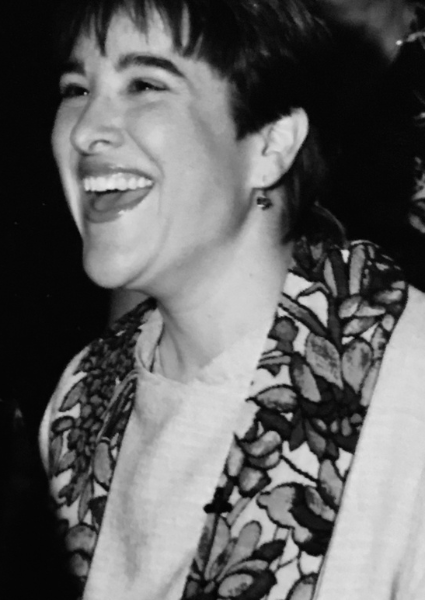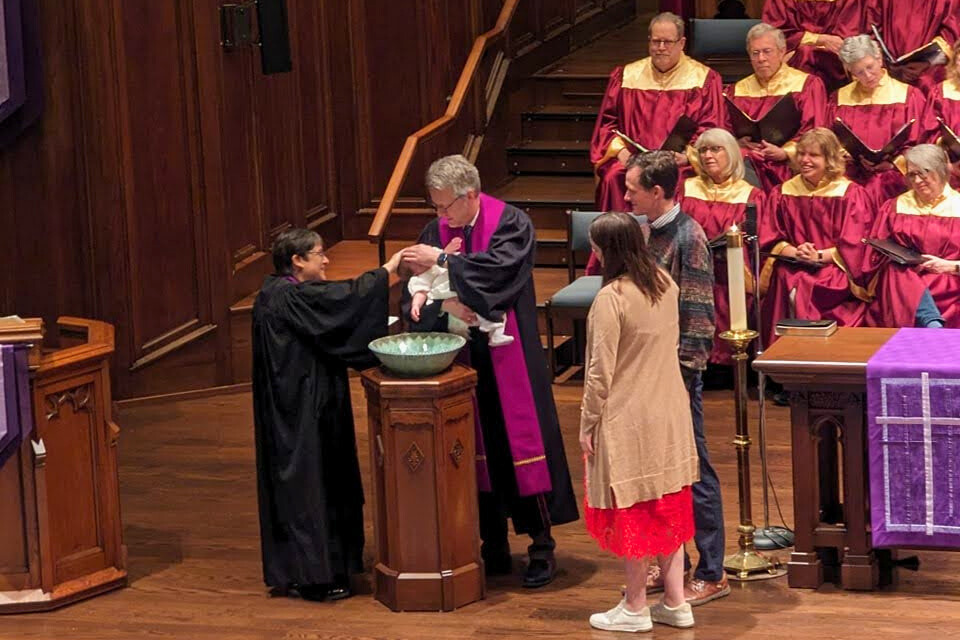Reflecting on the historic decisions at General Conference, Rev. Sue Petro speaks to how her personal journey intersects with the larger story — the church’s story — that is unfolding.
REV. SUE PETRO
Associate Pastor, Grand Rapids: First UMC
Three weeks after the 2024 General Conference decided to lift the ban on gay clergy, an email arrived in my inbox from the producer of a national TV show requesting an interview. I laughed. I remember thinking I needed a haircut before going on camera. I also needed something slimming to wear — nothing sleeveless. And notes — lots of notes.
I planned to be like Rachel Maddow: sharp, articulate, funny, and fluid. But when the producer dared to sidestep the safety of my intellect by asking a personal question, my brain seized like a broken bicycle chain. Suddenly, it wasn’t theology, church polity, or the denomination’s future — it was my life. “What does this historic decision mean to you, personally?” The room filled quickly with awkward silence as the camera continued to roll. The producer was patient and kind, gently leaning forward in her chair as she offered me an encouraging smile. So much for forward momentum. A graceful flip over the handlebars was more like it! This was my third interview in three weeks, and still, I was unprepared. In retrospect, I shouldn’t have been so surprised or so impatient with myself. There is no ending exile instantaneously. The body, the breath, the soul — they all need time to catch up. To absorb. To acclimate to honor withheld for half a century.

How does anybody suddenly belong to a church that cannot be trusted to love you? There is nothing sudden about it. It takes time to build a belonging that isn’t always at risk. In many ways, I’m still trying to belong to my own body, to the bend and stretch of full humanity after being so narrowly confined by the denomination as an object of conflict, disaffiliation, and debate.
For ten years, I chose myself and my wholeness outside the walls of the church. Those closest to me argue that I am a better person for it. But the remedy of personal strength, deep introspection, and fierce independence, necessary for a season, only goes so far. Author Audre Lorde says it best: “Without community there is no liberation, only the most vulnerable and temporary armistice between an individual and her oppression.” In anger, my habit is to withhold. I didn’t want to come back to the church. I didn’t think I needed to. Through years of prayer and the gentle healing work of the Holy Spirit, I slowly surrendered to a deeper wisdom. A communal wound needs communal healing. God was calling me to return.
I confess I was curious about what it would feel like to attend Annual Conference this year after a ten-year disconnect, just 29 days after General Conference decided to become a fully inclusive church. When I was ordained an elder in The United Methodist Church 28 years ago, I was congratulated. I wasn’t sure I could bear being congratulated again — by some of the same people — simply for being gay. A thought that would diminish me if I let it. But instead, I chose to be loved. To be part of the whole. To allow the clergy covenant to renew itself and me by the grace of God being poured out among us. The experience was both wonderful and strange.
On a congregational level, transformation and healing were well underway. Being a fully inclusive church was the custom. Those marginalized by the church at large were already flourishing, myself included. By the time word from General Conference hit the news cycle, I had been successfully serving under full-time appointment at Grand Rapids: First for ten months. Together, we were learning how to embody liberation in its particularities, moving the narrative beyond a simple welcome. As a congregation, we were expanding our vocabulary of inclusion. Words like respect, thrive, cherish, and celebrate are becoming the norm.
Living in our congregation’s grace-filled reality made it easier for me to conclude that what happened in Charlotte, North Carolina, on May 1, 2024, had very little to do with me. I told myself it wasn’t my story. It is the church’s story. A church owning its mistakes. A church apologizing. A church interrupting oppression with a single vote. I convinced myself I just happened to be swept up into the corporate narrative as a gay clergyperson whose vocation was eclipsed by a commitment to love. At the right place and time in history to help right the wrong. But I no longer believe that. Only together do our stories bear full witness to God’s faithful love.
I was called by a community. Received by a community. Celebrated by a community. For better or for worse, my story has always been intertwined with the church. In the larger picture of my life, the joy and pain of ministry, as I have known it, has been unmatched. The opportunity to continue living out my call to the fullest with a congregation that shares my joy is a blessing I now cherish. I pray that one day, this will be the story of every pastor and congregation living into full inclusion. But for now, I know it is not.
A denomination with a long tradition of social holiness is now quietly asking, “What’s next?” It will no doubt take time for the church to mature beyond the mandates of justice into something more tender and true. Nobody wants a welcome prompted by a piece of legislation. Nobody wants a place at the table because it’s time. Being present among members of the Body of Christ merely as proof of progress fails to move us forward meaningfully. The hallmark of genuine community lies in our capacity to celebrate one another and to allow “the other” to be a source of our joy.
As United Methodists, our joy is still taking shape. The road to liberation has been long and hard, causing me to wonder, at times, if we will even recognize ourselves when we have nothing to push against. A sacred pause is essential in honoring the need for every human being to be whole, unresolved, rested, and well. Only God can transform us at the deepest level. There is indeed much work yet to be done. But for now, I choose to delight in the denomination’s in-between space, trusting God to meet us in our stillness and value us there as we catch our communal breath.
Last Updated on July 30, 2024

